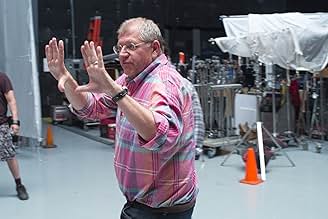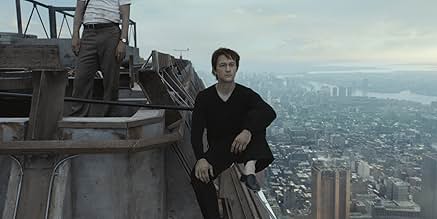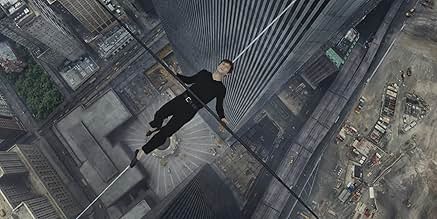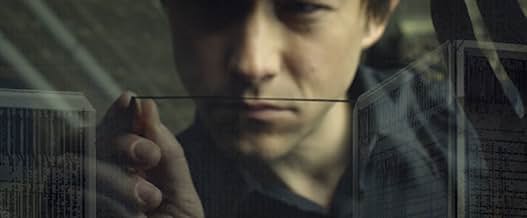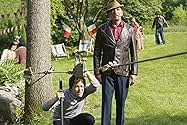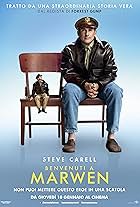Nel 1974, l'artista Philippe Petit recluta un team di persone per aiutare a realizzare il suo sogno: camminare nell'immenso vuoto tra le torri del World Trade Center.Nel 1974, l'artista Philippe Petit recluta un team di persone per aiutare a realizzare il suo sogno: camminare nell'immenso vuoto tra le torri del World Trade Center.Nel 1974, l'artista Philippe Petit recluta un team di persone per aiutare a realizzare il suo sogno: camminare nell'immenso vuoto tra le torri del World Trade Center.
- Regia
- Sceneggiatura
- Star
- Premi
- 3 vittorie e 17 candidature totali
- Outdoor Café Woman
- (as Emilie Leclerc)
Recensioni in evidenza
Petit's story has become widely known and discussed thank to "Man on Wire," a fantastic 2008 documentary that outlines in detail the how and why of his fearless act. Robert Zemeckis's "The Walk," however, is a well-made, thematically significant account of the events, told within the boundaries of a biopic that takes an introspective, fourth-wall-breaking look at how Petit accomplished what he did.
Petit is played by Joseph Gordon-Levitt, who stands atop The Statue of Liberty whilst telling this unfathomable story. From the first scene, showcasing Petit on the statue, one will immediately detect a strangeness in Gordon-Levitt's French accent. The man who we recently saw proudly boasting and owning a full-bloodied Italian accent has now adopted a rather hammy French accent that occasionally treads the line of self-parody. This is the film's first, and really only, obstacle; if you can get past this, your enjoyment of the film will likely be pretty high. If you can't overlook this, I wish you the best one-hundred and twenty minutes.
The film follows Petit's humble beginnings on the streets of France as a young troubadour, from performing as a street-mime and meeting Annie (Charlotte Le Bon), a singer who performs in the streets as well, who will eventually be an accomplice to his high-wire act in New York City, to becoming an ambitious wire-walker. He enlists in the help of Papa Rudy (Ben Kingsley), a famous tightrope walker in the circus, who agrees to help him accomplish his dreams, albeit reluctantly so. The remainder of the latter half of the film concerns the extensive planning and development of Petit's plan to walk the rope between the Twin Towers and subsequently carrying out his actions.
Audiences sold by the film's series of daring and ambitious trailers may be shocked to note how much goes into the exposition of the buildup and around-the-clock planning of the walk itself. By the hour mark, I was beginning to question why Zemeckis, a known "visualist" in Hollywood, responsible for gems like "Back to the Future" and "The Polar Express," was chosen to direct a film that was so narrative-driven. But then, as quickly as the film began, the scenes atop the World Trade Center did, and in a way, allowed the real film to finally start as a result. When one sees how magnificent and captivating the scenes surrounding Petit's walk is when they'll see Zemeckis's artistic vision; it was an event so unspeakably tranquil yet suspenseful that I couldn't help but feel my palms sweat. The way Zemeckis and cinematographer Dariusz Wolski - who intently focuses on clouds and atmospheric naturalism during the walk - wrap the audience up in the awe-inspiring risk and inherent danger that comes with this event makes the film transcend fiction in a way that has the ability to give audiences a real experience. So few films do that that it becomes petty to complain about something like the weakness of Gordon-Levitt's accent.
On a thematic note, however, "The Walk" is a fascinating look at the ideas of optimism and courage that have ostensibly become interwoven in the fabric of American society of the years. The Twin Towers, in the film and in real-life, represented financial stability and international connectedness, and Zemeckis works to emphasize it in a way that spells out loving respect more-so than it does imminent disaster. The towers are viewed as a simple of untold bravery, much like Petit, and "The Walk" reminds us of a time period that still had the remainder of the world looking to America as a place of impossible achievement.
Zemeckis does a wonderful job at blending drama with visuals here, much like he did in his last film "Flight," a brilliant drama that came unfairly branded as both a disaster film and a courtroom drama. With "The Walk," Zemeckis takes empathy-inspiring visuals and themes of American exceptionalism and makes them function in a manner that is germane to the film's inherent aura of wonder. If you want it broken down in a simplistic manner, however, its delightful cinematic qualities and breathtaking visuals justify the ticket-price.
The film is interspersed with scenes of Phillippe Petit (Joseph Gordon-Levitt) talking directly to the audience, narrating his life story and the events that led up to his high-wire stunt, or as he calls it – "le coup". This certainly takes away the potential emotional and cinematic impact longer, narration-free scenes would've had on audiences but it served the purpose of moving the story forward swiftly. The first half feels crammed even though it is pretty much by-the-books: we skim through Petit's life leading up to the event without going in-depth. Which is understandable for a reasonable running time as there is a lot of ground to cover.
The unbearably intense second half surely makes up for this. It's taut with thrills and sequences boasting miraculous visual effects. The 30-minute finale is a immersive, transporting and even physical (as evidenced by my sweaty palms) experience that's one-of-a-kind. In fact, I would go so far as to say that there's no point watching the film anywhere else other than at a cinema.
Levitt's passionate performance is commendable and definitely contributes to a sufficiently emotionally satisfying third act. The film also makes it clear that this wasn't a one-man-show by highlighting Petit and his allies' team spirit. With "The Walk", Robert Zemeckis has given us another crowd-pleasing piece of popcorn entertainment.
The Walk is a masterpiece. It is an extremely realistic & immersive theater experience. Director Robert Zemeckis has done a wonderful job in recreating the actual events of Petit's life. The last 40 minutes of the film, is worth the ticket price alone. The Walk is my all time favorite 3D movie. Right from the first scene, till the last scene, the 3D provides both immense depth & many eye-popping moments. The cinematography is wonderful. Both Paris & New York City in the 1970s, have been portrayed beautifully. When Petit takes that climactic walk between the Twin Towers of the World Trade Center the 3D definitely adds to the thrill of the experience. If you have a fear of heights or even otherwise, you will be on the edge of your seat as Philippe Petit embarks on one of the most dangerous feats ever attempted, in the history of mankind. You will be hoping against hope that Philippe Petit successfully completes his life changing walk. Joseph Gordon-Levitt is outstanding as Philippe Petit. The fact that Gordon-Levitt learned the art of tightrope walking & speaks in an authentic French accent is commendable. Charlotte Le Bon is great as Annie. Ben Kingsley is superb as Papa Rudy. Clement Sibony is brilliant as Jean-Louis. Cesar Domboy is amazing as Jeff/Jean-Francois. Steve Valentine is good as Barry Greenhouse. James Badge Dale is awesome as Jean-Pierre/J.P. Ben Schwartz & Benedict Samuel are impressive as Albert & David respectively. The Walk is a must watch. If you're not a movie buff but, you want to watch one movie in the theater this year, make it The Walk.
This is the story of Philippe Petit, a performer with the idea of wire-walking across the World Trade Center towers. While it may sound simple, the journey there is a captivating one. The presentation is almost magical with circus act and flamboyant atmosphere, although there are plenty of realistic details and intricate planning involved, at times it almost feels like a funny heist movie.
Visual is breathtaking, the cinematography takes full advantages of the vistas, let it be small village or big city. The way the scenes are shot gives the movie a much more surreal ambiance. It's an enhanced realism, and although it's not as refined, there's a spirit of Hugo lingering here. It makes great use of 3D with timely panoramic shots and even stuff-thrown-at-your-face antic, but for this movie I wouldn't mind.
The same goes with its jazz influenced soundtracks, occasional slow ballad or alternate take on popular songs. The production value just oozes gorgeousness. All the technical aspects aside, the best attraction is definitely Joseph Gordon-Levitt. He is utterly remarkable, youthful and charming. This is the kind of acting prowess that can captivate audience with sheer passion, it's a true homage to the real life counterpart.
The Walk is nothing short of a breathtaking tale. Its charismatic protagonist and masterful visual invite the audience to not only walk alongside, but in a sense glide freely through such an inspiring story.
Lo sapevi?
- QuizPhilippe Petit personally trained Joseph Gordon-Levitt how to walk on a tightrope. When the training started, Petit predicted that Gordon-Levitt would need no more than eight days of training to be able to walk on a wire alone, which came true.
- BlooperWhen practicing the line shoot via bow and arrow in France, the distance needed is clearly marked and Phillipe dances in celebration when the arrow surpasses it. Not long thereafter - with the group in New York - Phillipe has to pull a press conference ruse to get that same distance information. Furthermore, even if he hadn't already made his calculations back in France, it is as simple as measuring the distance at the base.
- Citazioni
[first lines]
Philippe Petit: "Why?" That is the question people ask me most. Pourquoi? Why? For what? Why do you walk on the wire? Why do you tempt fate? Why do you risk death. But, I don't think of it this way. I never even say this word, death. La mort. Yes of okay, I said it once, or maybe three times, just now... But watch, I *will* not say it again. Instead, I use the opposite word. Life. For me, to walk on the wire, this is life. C'est la vie.
Philippe Petit: [now standing in the torch of the Statue of Liberty] So, picture with me it's 1974, New York city, and I am in love with two buildings - two towers. Or as everyone in the world will calls them, the Twin Towers of the World Trade Center. They call to me. These towers, they stir something inside of me, and they inspire in me a dream. My dream is to hang a high-wire between those twin towers, and *walk* on it! Of course, uh, this is impossible, not to mention, illegal. So, why attempt the impossible? Why follow your dream? But, I cannot answer this question why, not with words. But I can show you how i happened. And so, we must go back in time, and across the ocean, because my love affair with these beautiful towers did not begin in New York. In case you couldn't tell, I'm not from here. No, my story begins in another one of the world's most beautiful cities, se Paris.
- Colonne sonoreDouce Candy
Adaptation of "Sugar Sugar"
Written by Jeff Barry and Andy Kim
Adapted by Arlette Kotchounian
Performed by Claude François
Courtesy of Mercury Records France
Under license from Universal Music Enterprises
I più visti
- How long is The Walk?Powered by Alexa
Dettagli
- Data di uscita
- Paese di origine
- Sito ufficiale
- Lingue
- Celebre anche come
- En la cuerda floja
- Luoghi delle riprese
- Aziende produttrici
- Vedi altri crediti dell’azienda su IMDbPro
Botteghino
- Budget
- 35.000.000 USD (previsto)
- Lordo Stati Uniti e Canada
- 10.137.502 USD
- Fine settimana di apertura Stati Uniti e Canada
- 1.560.299 USD
- 4 ott 2015
- Lordo in tutto il mondo
- 61.181.942 USD
- Tempo di esecuzione2 ore 3 minuti
- Colore
- Mix di suoni
- Proporzioni
- 2.39 : 1







